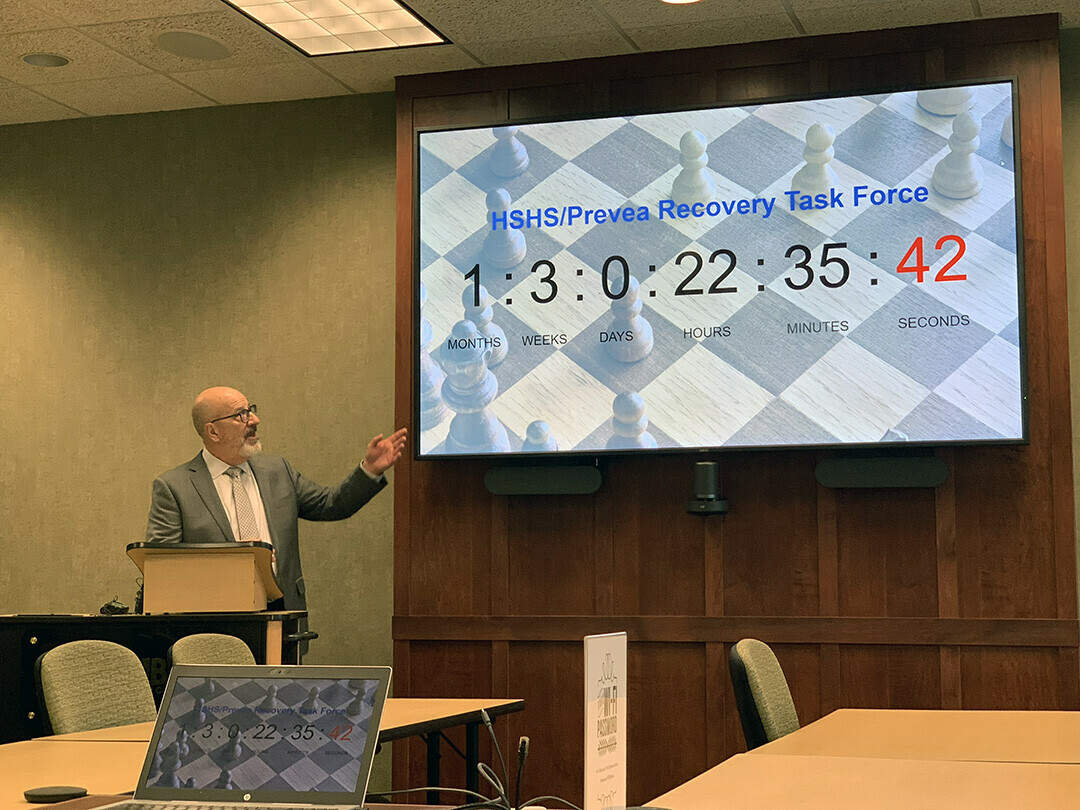ON LIFE SUPPORT: Local Leaders Scramble to Address Impending Hospital Shutdowns
community is ‘farther behind the eight ball’ because of sped-up timeline
Tom Giffey, photos by Andrea Paulseth |
Just as they were blindsided by the January announcement that two Chippewa Valley hospitals would close, local leaders and residents were surprised when Illinois-based Hospital Sisters Health System said Sacred Heart Hospital would shut down for good on March 22 – nearly a month earlier than originally expected.
“What was already short notice to lose these HSHS hospitals and the services of the Prevea Clinics becomes even more of a crisis with these earlier closures,” said Dr. Bill Rupp, co-chairman of a local task force formed to address the situation. “We are committed to working through all this, but this new development makes it even more challenging.”
The March 11 announcement of the final closing date came without warning, added David Minor, president and CEO of the Eau Claire Area Chamber of Commerce, who helped form the task force within days after the revelation that Sacred Heart and St. Joseph’s hospitals would close.
”
It’s unfortunate that we have to ramp our speed up in this whole thing, but as the task force has done from the beginning, we’re going to shift and work with our existing entities to do what we can.
DAVID MINOR
EAU CLAIRE AREA CHAMBER OF COMMERCE PRESIDENT/CEO
“It’s unfortunate that we have to ramp our speed up in this whole thing, but as the task force has done from the beginning, we’re going to shift and work with our existing entities to do what we can,” Minor said at a March 14 press conference.
Originally, HSHS said Sacred Heart would close “on or before April 21,” but in recent weeks it has moved swiftly to wind down operations. HSHS St. Joseph’s Hospital in Chippewa Falls will close on March 22 as well.
In a media release, John Wagner – president and CEO for the two Western Wisconsin hospitals – said the decision was made because of the HSHS “commitment to maintain safe, quality care for our patients.”
At a press conference, Minor said the swift move was likely influenced by the fact that many HSHS employees have already taken new jobs, leaving the already struggling hospitals with low staffing levels.
“We’re very disappointed,” Minor said. “Certainly it puts us farther behind the eight ball. We’ve just lost another month to be able to provide those critical care access points, one of them being the emergency rooms. I wish I could make some announcement that we had a grand plan to absorb all that, but it’s not that easy.”

However, the chamber and the task force are working with the region’s two major remaining health care providers – Marshfield Clinic and Mayo Clinic Health System – to see how they can access $15 million in unspent state funds earmarked to address the crisis.
“Both of them right now are aggressively looking at options,” Minor said, referring to Mayo and Marshfield. “What can they expand, how can they do it, and where can that money come into play.” Minor is hopeful that the two health systems will have proposals to present to the state Legislature’s Joint Finance Committee within the next month. However, he noted that the health systems’ plans have to be financially sustainable in the long run because $15 million won’t go very far.
The $15 million was originally set aside in the 2021-23 state budget to help HSHS expand its psychiatric services in the Chippewa Valley, but the money was never spent. In February, the state Legislature passed a bill that put the money in a grant program to fund emergency room services in the region. Gov. Tony Evers signed the bill into law, but with a partial veto the expanded the ways the funds could be used.
While HSHS has had little to say about the closure publicly, Minor confirmed that leaders of the hospital system have been in communications with the task force’s leadership team on a weekly basis. He said he has continually encouraged HSHS to communicate with OakLeaf Medical Network, another major local health system. In early February, OakLeaf announced it wanted to buy Sacred Heart Hospital, but negotiations went nowhere.
“I’ve had to play Switzerland in this game, but that’s what we do in the chamber to begin with,” Minor said of his attempts to get HSHS and OakLeaf to negotiate. “We have to remain in the middle.”
In the meantime, OakLeaf – a network of 26 clinics and more than 320 medical providers – has helped boost an effort to create an independent community hospital. Specifically, it’s paid for consulting and legal costs for the creation of the Chippewa Valley Health Cooperative, a newly formed co-op that could pave the way for a new hospital.






















